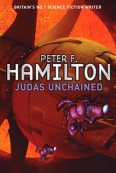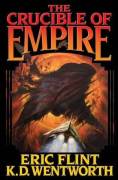
 These two books are simply two volumes of the same novel, dubbed the Commonwealth Saga. With the invention of wormhole technology by straight arrow Nigel Sheldon and eccentric Ozzie Isaacs, traditional space exploration (vacuum, spaceships, all that kind of thing) is all but abandoned. Rail lines running between worlds through wormholes are the only means of interstellar transport, and humanity is rapidly expanding to many planets.
These two books are simply two volumes of the same novel, dubbed the Commonwealth Saga. With the invention of wormhole technology by straight arrow Nigel Sheldon and eccentric Ozzie Isaacs, traditional space exploration (vacuum, spaceships, all that kind of thing) is all but abandoned. Rail lines running between worlds through wormholes are the only means of interstellar transport, and humanity is rapidly expanding to many planets.
Hamilton seems to have been inspired by Richard Morgan’s Altered Carbon when it comes to rejuvenation technology, although there are differences. Practical immortality is available to all but the very poor. Most people pay money into a sort of pension fund which pays for rejuvenation. The more well to do rejuvenate more often, staying forever young. This has brought about a maturing of humanity, where planning is much more long-term. Careers span decades and centuries. The rich can take entire “sabbatical lives”.
These two massive upheavals, longevity and cheap transportation over interstellar distances, have led to an unprecedented period of growth and prosperity for human society. A commonwealth unites the worlds. The Commonwealth is nominally a democracy, but the reins of power are firmly in the hands of dynasties rich enough to own entire planets. A utopia of sorts, but not really a democracy despite outward appearances.
A mysterious stellar event far outside the human sphere of influences forces the construction of a starship. It is the first one ever built. Former astronaut (immortality remember?) Wilson Kime captains the mission, which leads to the escape of the greatest threat humanity has ever faced from its ancient prison. And it soon becomes clear that the escape was not entirely an accident. There are mysterious forces at work inside the Commonwealth.
In the tradition of that other (even more) massive Hamilton opus, Night’s Dawn, this story is a somewhat daunting cornucopia of characters and interweaving subplots. This author can get away with it, since even his explanatory filler is eminently enjoyable. An immensely rich societal backdrop forms the stage for a drama with some very unexpected twists and turns. The most insignificant details come back to haunt the characters in what is obviously a very finely and meticulously crafted story. The end of Pandora’s Star is a massive cliffhanger and the story picks right back up in Judas Unchained, so I would recommend reading the two volumes back to back.
The story is peppered with wondrous things such as the Silfen, an enigmatic race of aliens, and their even more enigmatic forest paths, which lead seamlessly from world to world. Even the enemy is fascinating and an example of a true non-human intellect. There are bizarre, enigmatic and just generally cool characters such as super investigator Paula Myo, slut turned reporter Mellanie Rescorai, the orphan Orion, cult leaders, resistance warriors, criminals and politicians. A tangled web held together elegantly by Hamilton.
The story moves from utopia through gathering storm through all-out chaos and war to a spectacular conclusion, and is finally neatly put to bed in the epilogue. The true genius of Hamilton is that his universe is not populated by 20th Century humans living long lives and using wormholes. Society and its inhabitants are quite different, reflecting the changes in society and culture brought about by technological advances. Motivations, reactions and behaviors are believably described for these “future humans” (and aliens), just as a 17th Century human would behave differently from us.
It should be clear by now that this novel is among the very best I have ever read. Sure, one could criticize the perhaps unnecessarily long road chase in the second volume, or the seeming abandonment of a few supporting characters at the end. But the truth is that it is very very difficult to write something this long, with so many character relationships, and not run into the occasional pacing problem.
So stop reading this and order the books. You will not be disappointed. And if you want more, Hamilton returns to the Commonwealth Universe and many of the characters in the Void Trilogy, set over a thousand years later.

 Lt. Leary, sans ship, is sent to Ganpat’s Reach as an advisor. His mission is to untangle a messy inter-system invasion that threatens the interests of a Cinnabar ally. Conveniently, he can hire his own former ship, the Princess Cecile, and most of the Sissies, to convey him. On arrival, he finds a complex web of intrigue and machinations.
Lt. Leary, sans ship, is sent to Ganpat’s Reach as an advisor. His mission is to untangle a messy inter-system invasion that threatens the interests of a Cinnabar ally. Conveniently, he can hire his own former ship, the Princess Cecile, and most of the Sissies, to convey him. On arrival, he finds a complex web of intrigue and machinations.















































